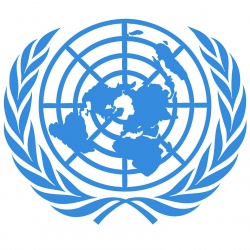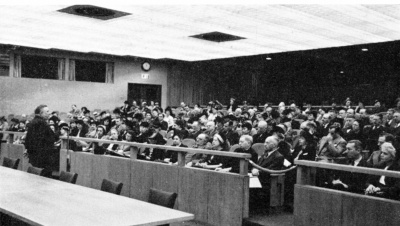United Nations
The United Nations is an intergovernmental organization founded in 1945, with stated aims that include promoting cooperation in international law, international security, economic development, social progress, human rights, civil rights, civil liberties, political freedoms, democracy, and the achievement of lasting world peace. Theosophists have been supportive of the United Nations since its inception.
Blavatsky and the United Nations
Joy Mills wrote an article about "H. P. B. and the U. N." in 1970:
To link H. P. B. and the U. N. may seem incongruous. Yet there is certainly a relationship between the goal which she set forth in the re-enunciation of an ageless wisdom concerning man and the efforts to realize that goal in practicality through world order under world law. The alternative is world chaos and world destruction. In May 1889, H. P. B. published in her journal, Lucifer, an analysis of “Our Cycle and the Next,” stating unequivocally: “If Theosophy prevailing in the struggle, its all- embracing philosophy strikes deep root into the minds and hearts of men, if its doctrines of Reincarnation and Karma, in other words, of Hope and Responsibility, find a home in the lives of the new generations, then, indeed, will dawn the day of joy and gladness for all who now suffer and are outcast. For real Theosophy is ALTRUISM, and we cannot repeat it too often. It is brotherly love, mutual help, un-swerving devotion to Truth. If once men do but realize that in these alone can true happiness be found, and never in wealth, possessions, or any selfish gratification, then the dark clouds will roll away, and a new humanity will be born upon the earth. Then, the GOLDEN AGE will be here, indeed...
The Theosophical Society, dedicated from its inception to the ideal of brotherhood, has been called the first United Nations, comprising as it does within its membership individuals of many nations, many cultural and ethnic backgrounds. If we who are its members today, building out of all differences and distinctions a unique harmony of purpose, remain loyal to the vision toward which H. P. B. pointed, it may be our privilege to portray the pattern of a truly universal brotherhood of humanity, founded on the spiritual perception of man’s essential nature. No higher privilege could come to any group of men and women, but the price of brotherhood is paid with the currency of present action, not the promissory notes of tomorrow’s good intentions.[1]
Theosophists anticipating need for United Nations
James S. Perkins, President of the Theosophical Society in America from 1945-1960, spoke in a public lecture in 1942 about the need for an international structure:
If the postwar world establishes a federation of free peoples, strong enough to promise the end of military aggression, “we will have a world in which human intelligence will organize and distribute the ample resources of Nature and devote itself to human progress rather than to destruction,” James S. Perkins, vice-president of the Theosophical Society in America, said in a lecture at the society’s rooms here last night.
“But tomorrow’s world,” he cautioned, “will inevitably grow out of today’s acts. Since human progress advances or falls upon the moral and spiritual integrity of the main body of its individuals, the condition of tomorrow’s world rests squarely upon the question whether men in their daily lives are giving expression to those universal principles which are the ethical foundations of any great and enduring world order.”[2]
Involvement of Theosophical Society (Adyar)
After World War II, Perkins was appointed by Adyar president C. Jinarājadāsa to be the Theosophical Society's delegate to the opening conference of international groups, held at Lake Placid, New York. About 250 people attended, representing over 100 organizations. This was one of the earliest sessions establishing the now-huge body of nongovernmental organizations (NGOs) that work with the United Nations on many issues. Perkins wrote about the meeting and described how Theosophists could help the UN in communicating its resources and missions:
It is precisely because the UN is the most advanced effort in the direction of brotherhood ever made by collective mankind that Theosophists should support it in every possible way...
The principle requisite is to stimulate a direct interest in the activities of the UN by broadcasting information about its programs and needs. A study of this world-wide organization of human energy being applied realistically to the major problems of freeing the world of want and fear cannot fail to arouse our interest and enthusiasm. Once grasped, the integrated pattern of the UN's various departments and commissions produces a sense of wholeness which is unfortunately lacking in the minds of most people.
Throughout the conference... the need was expressed again and again to inform people of the world in all languages of the character and the operations of the various departments of the UN. Mrs. Perkins and I were impressed with the unique opportunity afforded individual members of The Theosophical Society and the Theosophical Order of Service to serve in this capacity. Lodges or members can initiate programs to distribute information if they will become acquainted with the general set-up of the UN, discovering what information is available and how it may be used.[3]
The international Theosophical Society applied to be accepted as an official non-governmental organization of the U. N., but the application was not accepted. Most NGOs of that era were aid agencies like the International Red Cross, and the TS did not meet that qualification.[4]
Involvement of Theosophical Order of Service
Notes
- ↑ "Joy Mills, "H. P. B. and the U. N.," The American Theosophist 58.4 (April, 1970), 70-71.
- ↑ ”Theosophical Society Hears Vice-President,” ‘’Springfield Republican’’ (Springfield, MA) (April 24, 1942), 4.
- ↑ James S. Perkins, The American Theosophist 36.5 (May, 1947), 100-101, 114.
- ↑ United Nations correspondence. Adyar Archives.

